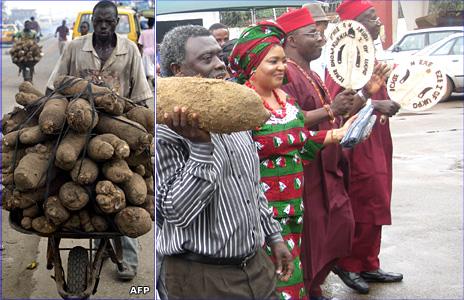Celebrating Nigeria's yummy yams
- Published

Nigerian yam festivals marking the end of the farming season are akin to new year festivities
For Nigerians currently feasting on and celebrating the yam harvest with carnival-like festivities, the starchy tuber is more than a food staple.
Traditional fertility and marriage ceremonies are not carried out in the south-east of Nigeria unless a big unwieldy yam - which can weigh up to 70kg (150lb) - is presented.
This is why the Igbo people refer to yam as "the king of crops" and August and September are a time for traditional dances, drumming, masquerades and dressing up in village squares.
"From my great grandfathers, yam has always been celebrated because it is very important to us," said Mary Eze at a new yam festival in the village of Ukpo Dunukofia in Anambra State.
"We can pound yam, we can boil the yam and when we eat we have a lot of energy," she added, boasting of its versatility.
Yams are a primary agricultural commodity across much of West and Central Africa where tubers are planted between February and April and harvested 180 to 270 days later.
Annual yam festivals are also observed at this time in other African countries as the tubers of the early maturing varieties are harvested and delivered to markets.
In Ivory Coast, for example, funerals and burials are delayed in some communities until the local yam festival has been observed to underscore the importance attached to the crop.
Pest pressure
But there are fears for such traditions as the cultivation of the crop, consumed by 60 million people on a daily basis in Africa alone, is under threat.
"Instead of growing yams, Igbos have embraced trading," says Professor Felix Nweke, a development economist.
"They are now only celebrating yams and not growing it."
Yam cultivation began 11,000 years ago and the tubers now grow on vines in Africa, the Americas, the Caribbean, South Pacific and Asia.
But farmers in Africa's "yam belt" - comprising of Nigeria, Ghana, Benin, Ivory Coast, Central Africa, Cameroon and Togo - produce more than 94% of the world's yams.
And Nigeria alone accounts for 71% of the world's total production.
Though driving through the country's southern and middle belt regions, one would never know there was a problem.
Fields look green and fertile and seem to promise a good yam harvest.
Yet experts say yam production is decreasing in some traditional producing areas because of declining soil fertility and increasing pest pressure.
"Yam has come under serious threat from pests and is in competition with other less nutritious crops like cassava," says Robert Asiedu, research director at International Institute for Tropical Agriculture (IITA) in the Nigerian city of Ibadan.
Yam bank
Another challenge facing yam production is the high cost of labour and there appears not to be enough capital available to farmers for increasing their production.

Small-scale farmers like Thomas Anioji find it hard to get loans
Most small-scale farmers in Nigeria are not able to access loans because of a lack of security or track record.
This is the fate of farmers at Isu-Awa community in Awgu, Enugu State, who are no longer able meet their family needs because of declining production.
"It's so difficult to get support to plant yams," says farmer Thomas Anioji.
"I have tried several times to get government loans. They promise to come today, come tomorrow and they never give me any loan."
But hope is at hand for the long-term conservation of Africa's yams thanks to an initiative by the Global Crop Diversity Trust.
Its scientists say the continent's yam varieties are in danger of being picked off by pests or diseases and common disasters like fire or flooding.
This month the trust started an ambitious project to add 3,000 yam samples to an international gene bank at IITA, external to guarantee the diversity of the crop.
"It's really akin to putting money in the bank," Cary Fowler, the trust's executive director, said in a statement.
"All crops routinely face threats from plant pests, disease, or shifting weather patterns, and a country's ability to breed new varieties to overcome these challenges is directly tied to what they have in the bank, not just in terms of financial resources but in terms of the diversity in their crop collections."
Using the collection, scientists hope to able to find disease-resistance traits with higher yields - key to improving farmers' fortunes.